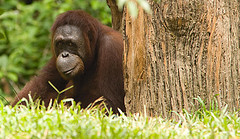Why is Palm Oil a Problem?

The environmental issues with palm oil are largely due to the places where the palm trees are planted. Palm oil is a valuable crop and growing it can make farmers a lot of money. In fact, the governments of countries such as Indonesia have provided grants to farmers who choose to grow palm oil in an attempt to lift areas of the country out of poverty.
Unfortunately, the desire for more and more land on which to grow palm oil, has caused farmers to cut down and/ or burn areas of rainforest in order to make room. This habitat destruction has had devastating effects on the biodiversity of huge swathes of land as well as driving endangered animals such as orangutans, tigers and rhinos to the brink of extinction. Habitat loss caused by palm oil farming is believed to be the biggest threat to the survival of both the critically endangered Sumatran orangutan and the endangered Bornean orangutan. Indigenous peoples have also found themselves displaced by plantations encroaching onto their lands, forcing them to seek refuge.
Indonesia and Malaysia produce 86% of the world's palm oil. Palm oil production is such a huge business in Indonesia that the country has gained the title of “World’s Fastest Rainforest Destroyer” in the Guinness Book of World Records.
As well as causing habitat and biodiversity loss, palm oil plantations are responsible for enormous carbon emissions. Valuable trees are harvested and the rest are burnt to clear the land for the farming of palm oil. Burning the trees and the peatlands beneath them is highly polluting, although the ash improves the soil’s fertility before planting. In burning the rainforests Indonesia is also burning the peatlands below which store masses of carbon. Indonesia’s peatlands cover just 0.1% of the Earth’s land, yet contribute to 4% of the world’s greenhouse gases. This makes Indonesia the country with the 3rd largest carbon footprint in the world, when deforestation is taken into account!
In some countries, land that could be being used to grow food crops for local populations, is being used to grow palm oil for sale abroad. This has led to concerns that the need for fuel is being placed ahead of the need for food, leading to malnutrition in developing nations.
There are also reports of terrible human rights violations occurring in the palm oil production process with young children being used as cheap labour and many people being subjected to cruel and abusive behaviour.
Read More: Should we Stop Using Palm Oil?
